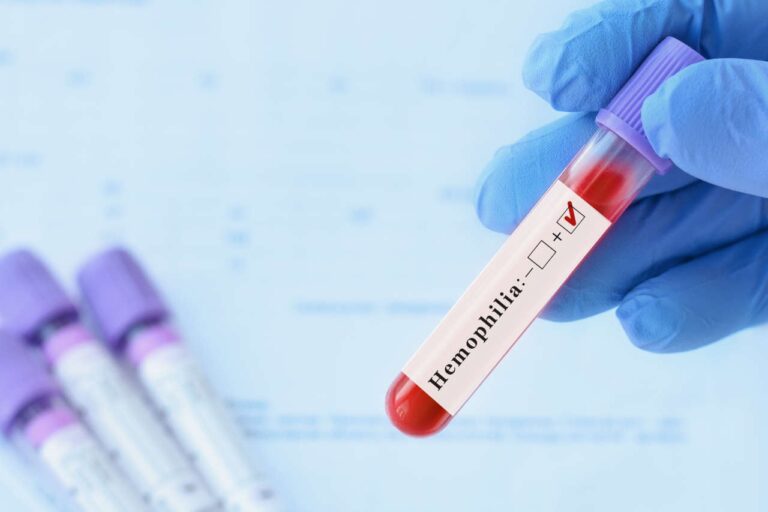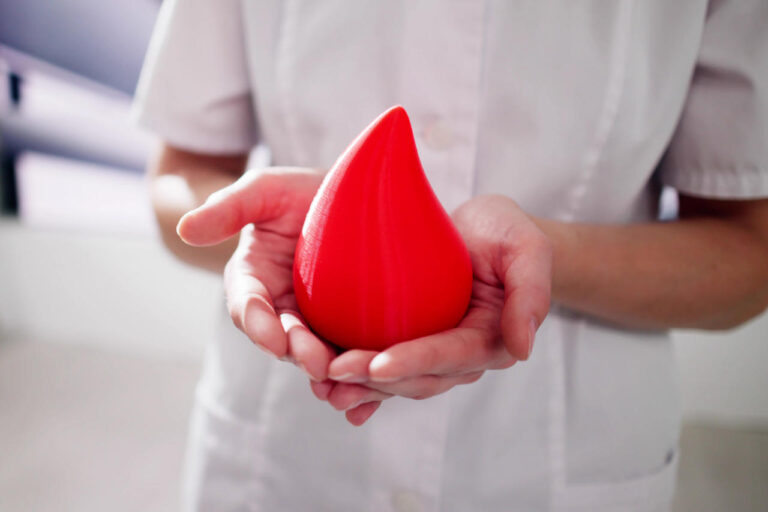
FEIBA (or factor eight inhibitor bypass activity) is used in patients who have hemophilia A or B and have developed inhibitors (antibodies) against the clotting factor medications (i.e., factor VIII or IX).
Get Copay Assistance Now
Hemophilia, a genetic disorder, is treated with clotting factor medications that help control bleeding episodes in patients. However, in some cases, the patient’s bodies start to produce antibodies (inhibitors) against these drugs, neutralize their effects, and make them less effective in preventing bleeding episodes.
FEIBA, also known by its generic name “anti-inhibitor coagulant complex,” works by bypassing the activity of these inhibitors and promoting blood clotting in patients with clotting factor inhibitors.
If your doctor has prescribed you FEIBA, this guide will help you learn important details about this drug, such as its usage, dosage, working mechanisms, associated side effects, warnings, and precautionary measures.
FEIBA: Indication or Usage
The FDA has approved FEIBA to be used in the following conditions in patients with hemophilia A or B with inhibitors:
- To control and prevent acute bleeding episodes
- To control excessive bleeding before, during, or after a surgical procedure
- For routine prophylaxis to prevent or reduce the frequency of bleeding episodes
FEIBA is not indicated to treat bleeding episodes in patients who do not have inhibitors against factors VIII or IX.
FEIBA: Composition and Mode of Action
FEIBA is a plasma-derived product and consists of multiple activated and non-activated clotting factors, including factors II, VII, IX, and X. It promotes blood clotting even in the presence of inhibitors (antibodies) in hemophilia A or hemophilia B patients.
Patients with hemophilia A can develop antibodies against clotting factor VIII, while hemophilia B patients can develop antibodies against clotting factor IX. These antibodies (inhibitors) neutralize the effects of factor VIII or IX drugs, making them less effective in controlling or preventing bleeds.
FEIBA bypasses the activity of these inhibitors and makes sure that the blood clots properly. It is important to know that this medicine does not cure your condition but only helps to control bleeding episodes.
Dosage and Administration
FEIBA comes in the form of lyophilized powder in single-dose vials containing concentrations of 500; 1,000; or 2,500 units per vial.
FEIBA is administered intravenously, and its dosage is tailored based on the patient’s clinical condition and the severity of the bleeding episodes.
1. Control and Prevention of Bleeding Episodes
Patients with minor to moderate bleeds may receive a dose of 50 – 100 units/kg, which is repeated every 6 – 12 hours until bleeding is resolved.
In cases of major bleeds (i.e., severe hemorrhage), the dose of FEIBA is increased to 100 units/kg with intervals adjusted based on clinical response.
2. Surgical Prophylaxis
Patients undergoing surgical procedures receive 50 – 100 units/kg immediately before surgery. Furthermore, additional doses may be given after the surgery, every 6 – 12 hours, until the bleeding is resolved and the damaged area is healed.
3. Routine Prophylaxis
In routine prophylaxis, a dose of 85 units/kg is administered every other day. The dose and frequency are adjusted according to the extent of bleeding and the patient’s clinical conditions.
전문가와 상담하세요
FEIBA Administration Process
After receiving the appropriate instruction from a qualified healthcare professional, FEIBA can be administered by a caregiver or by the patients themselves. Here are some useful tips you should follow when administering this drug safely.
- Follow an aseptic technique to reduce the risk of IV site-related infections.
- Feiba should be reconstituted with the provided diluent and administered as an intravenous infusion.
- Reconstituted products should be used immediately or stored at room temperature and used within 3 hours.
- The infusion rate should not exceed 2 units per kilogram per minute to minimize the risk of adverse reactions.
- Patients should be monitored closely during and after administration for any signs of adverse reactions.
- Do not combine FEIBA with other medications.
부작용

All medicines can have side effects. Some side effects are minor and temporary, while some could be severe and require immediate medical attention. Some common side effects reported by >5% of people during prophylaxis trials include:
- Anemia
- 설사
- Hemarthrosis
- Hepatitis B surface antibody-positive
- 메스꺼움
- 구토
The serious side effects seen with FEIBA include hypersensitivity reactions and thromboembolic events, including stroke, pulmonary embolism, and deep vein thrombosis.
Always consult your doctor or hemophilia treatment center if you experience any side effects after taking.
Warning
FEIBA can cause thromboembolic events following doses above 200 units per kg per day and in patients with thrombotic risk factors. Monitoring patients receiving FEIBA for signs and symptoms of thromboembolic events is important.
Contraindications
Patients who have or had a history of anaphylactic or severe hypersensitivity reactions to its components should not take FEIBA.
FEIBA is also contraindicated in patients suffering from a blood clotting condition called disseminated intravascular coagulation (DIC) and acute thrombosis or embolism.
재정 지원 받기
Drug Interactions
Some medicines may interfere with FEIBA and how it works. If you are taking any other medications like antifibrinolytic agents, such as tranexamic acid and aminocaproic acid, during your treatment with FEIBA, it can increase your risks of thrombotic events.
Similarly, taking other coagulation factors can affect the efficacy of FEIBA. Therefore, it is recommended to always discuss your medication profile with your doctor before getting a prescription for FEIBA.
Precautionary Measures
Always consult your healthcare provider before taking FEIBA if you are/have:
- Pregnant or plan to become pregnant
- Breastfeeding or plan to breastfeed
- Allergic to any of the FEIBA components
- Taking any over-the-counter medications, prescription medications like emicizumab, supplements, or herbal products
- Any medical problems
FEIBA: Estimated Cost
FEIBA is very expensive. The cost may vary depending on your location, insurance, and the pharmacy you visit.
참고문헌:
- 미국 식품의약국(FDA). FEIBA Prescribing Information: https://www.fda.gov/media/78852/download?attachment
- Tjønnfjord, G. E., & Holme, P. A. (2007). Factor eight inhibitor bypass activity (FEIBA) in the management of bleeds in hemophilia patients with high-titer inhibitors. Vascular Health and Risk Management, 3(4), 527. https://pmc.ncbi.nlm.nih.gov/articles/PMC2291336/
- Crea, R., Novack, A., Reininger, A. J., Kennedy, J., Raff, S., Gringeri, A., & Bajwa, N. (2016). Four Decade Cumulative Review of Thrombo-Embolic Events Reported with the Use of Activated Prothrombin Complex Concentrate in Congenital Haemophilia. Blood, 128(22), 5031. https://doi.org/10.1182/blood.V128.22.5031.5031
- Rota, M., Cortesi, P. A., Crea, R., Gringeri, A., & Mantovani, L. G. (2017). Thromboembolic event rate in patients exposed to anti-inhibitor coagulant complex: a meta-analysis of 40-year published data. Blood Advances, 1(26), 2637–2642. https://doi.org/10.1182/bloodadvances.2017011536
- Research, C. F. B. E. A. (2024). FEIBA. U.S. Food And Drug Administration. https://www.fda.gov/vaccines-blood-biologics/approved-blood-products/feiba#:~:text=FEIBA%20is%20an%20Anti%2DInhibitor,the%20frequency%20of%20bleeding%20episodes.
- MEHTA, R., PARAMESWARAN, R., & SHAPIRO, A. D. (2006). An overview of the history, clinical practice concerns, comparative studies and strategies to optimize therapy of bypassing agents. Haemophilia, 12, 54-61. https://doi.org/10.1111/j.1365-2516.2006.01367.x












